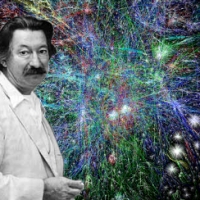In Memory of David Golumbia
“The lesson from the work that this book deploys is that we have to learn how to critique even that which helps us (much as computers help us to write books, like this one, among many other things). It would be better not to have computers, in that sense, than to live in a world where many more people come to believe that computers by themselves can ‘save us,’ can ‘solve our problems.’” – David Golumbia, The Cultural Logic of Computation.
My friendship with David Golumbia started and ended on Twitter.
It began roughly ten years ago, with the two of us discussing an article about the tech industry that had appeared in a major periodical (I don’t remember which one), and which both of us felt was insufficiently critical. And it came to a sad end last Thursday night when I saw a message, George Justice posted on Twitter, announcing David’s passing.
David Golumbia was a professor, a writer, a critic, an editor, a mentor, and to many people a friend. Seeing the replies, and quote tweets, to the announcement of David’s death is a testament to how many people knew and admired his work, and to how many people felt that David had helped them (in ways big and small) throughout the years. In their comments, his friends and colleagues remembered him for the righteous anger that infused his writing and his commentary, which at times could make him come off as a bit cantankerous, but which meant that he was willing to be loudly and openly critical of this or that tech trend/development/gadget long before taking such a stance was popular or prevalent. David was a prescient critic, and he was willing to stake out oppositional positions at a point when doing so could easily get one tarred as a technophobic Luddite. And though David was not particularly generous or forgiving in his assessment of tech companies, tech CEOs, or tech products—he was generous with advice, feedback, and with a friendly hand.
People tend to overuse the phrase “I wouldn’t be where I am without this person,” but when I think about David all I can think is that I genuinely don’t think I would be where I am today without him. David wrote recommendation letters for me, David provided me with publication opportunities, David edited pieces I wrote, David championed and disseminated my work, and whenever I needed advice (which was not an irregular occurrence) David provided me with the type of insightful guidance that actually helped me make decisions. And especially as a graduate student, this kind of support truly meant the world to me. I wasn’t ever actually one of David’s students, I was just a somewhat random person he at some point began interacting with on Twitter, but I always saw him as a mentor. And what’s more, over the years I came to see him as a friend.
Those of us who were lucky enough to know David will remember him for who he was, and for the impact he made on our lives. But for many others, David will be remembered primarily for the body of work he left behind. And he certainly left behind a body of work worth remembering. This is clear in the community of scholars and thinkers he drew together under his editorial leadership at the Digital Studies section of Boundary 2, but is even more powerfully true in terms of the books, articles, blog posts, and even tweets, he left behind.
David will likely be best remembered by many as a trenchant and outspoken critic of Bitcoin (and cryptocurrencies as well as other blockchain related projects), making his views on the subject clear in a number of publications, and in a short book titled The Politics of Bitcoin: Software as Right-Wing Extremism (University of Minnesota Press, 2016). And while it is a fairly non-controversial point—at least in academic and critical circles—to recognize that technologies have politics, David was unsparing in laying out precisely what politics he saw as lurking just behind the surface of cryptocurrencies (and much of the pablum about “Internet freedom” more generally). In contrast to the coverage that held up cryptocurrencies (and their boosters) as a gaggle of idealistic hackers, and ardent believers in a techno-utopian future, David emphasized how lurking behind these shiny new technologies was a mix of right-wing economic theory and ugly conspiratorial thinking. Ideologies that he warned had the potential to infect even the most left-leaning of attempts to harness cryptocurrencies and the blockchain.
That The Politics of Bitcoin (and much of David’s commentary on cryptocurrencies) has aged so well is a testament to just how prescient many of his critiques proved to be. Many people may have been shocked by the tumult of the crypto companies, and their founders, but David had never been taken in by the pleasantries and promises of riches made by those companies and their founders. And yet in acknowledging this it is imperative to remember that at the time David was making many of these critiques, doing so made him something of a gadfly and an outsider. Those in the crypto community (and Internet advocates more generally) weren’t particularly big fans of David’s criticisms, especially as he was making them at the point when crypto hype was still at its height—but David was not one to be dissuaded from voicing his opinion just because it was unpopular. It is not only that David’s writing aligns well with the current attention to the right-wing ideologies dominant in Silicon Valley circles, but that David was trying to get people to see the presence of those ideologies in those circles at a point when many were still investing much of their hope in Silicon Valley companies and leaders.
There is no doubt that David’s writing on cryptocurrencies was provocative and prescient—and it was accessible (both in terms of readability and in terms of publication venues) in a way that ensured these ideas circulated easily. Nevertheless, David’s first book, The Cultural Logic of Computation (Harvard University Press, 2009), provides a much deeper insight into his overall thinking. And with its focus on getting to the root of our computer exacerbated problems, provides a much more powerful and radical analysis.
One of the things that truly set David’s writing apart from other critics is the focus that he consistently brought to actual computers and to actual computing. Of course, David had no problem being critical of Apple or Google or Elon Musk or Mark Zuckerberg, but rather than act as though particular companies or particular people were somehow warping the supposedly beneficial potential of computers (and the Internet), David consistently argued that computers themselves needed to be seen as a major part of the problem. Or, at the very least, that the way that people (including people on the political left) thought about computers was the problem. And David was willing to say this clearly, as opposed to taking the all-too-common step of making a critical comment and then retreating behind a paragraph that swears fealty to the “potential” of computers and the Internet. No, David was clear, as he put it, “To begin with, I am less than persuaded that the democratizing effects of computers outweigh their tendency to centralize and concentrate power,” he emphasized what he saw as “the profoundly authoritarian bent of computationalism,” and consistently sought to draw people’s focus back to the way that computers had been a major “boon to centralized power.” David was genuinely concerned with small-d democracy, with the small-d democratic potential of technologies, and he remained convinced that computers (and the Internet) were not the friends of small-d democracy they were often portrayed as being.
David concluded The Cultural Logic of Computation with a series of questions, ones that were meant to reorient the conversation around computers, to move it away from discussions that focused on “technical capability” and towards the deeper and more complicated sorts of matters that we too often refuse to consider when talking about computers, namely:
“should computers be used for everything of which they are capable? Does the bare fact that computers can do something mean that it is better to have that thing done on computers than in the analog world? Does the fact that computers provide us with a significant pleasure of mastery license their use for things we must master? Are there situations and actions in which cultivating mastery might be a detriment, rather than an advantage? If we could show, as I have suggested here is plausible, that the relationship between individuals (and institutions) and computers produces problematic psychological and/or ideological formations, what correctives might we develop to these formations?”
These questions, which David posed in 2009, can be heard in the background of his later writing. And to a certain extent it seems that some of these questions are getting asked more often amidst the current discourse around all things AI—yet David’s work stands as a powerful reminder that there were some people who were trying to get us to wrestle with these questions back when questioning computer evangelism was much more likely to get one branded as a heretic.
As people react with anxiety and anger to news about AI, and various tech figures, with reactions of “who could have seen this coming!?!?!” It’s worth remembering, that David certainly did—and he tried to warn us.
David’s final book, on cyberlibertarianism, is forthcoming from the University of Minnesota Press. I had the great privilege of reading a draft of the book, and I can definitely say that it is David at his best. A mixture of theoretical and analytical richness paired with his barbed humor and his passionate fury over the messes that computers (and their advocates) continue to make. It is a book that is certain to make many people angry. Including many of the people who might have once dismissed of David as being a curmudgeonly fuddy-duddy, but who have publicly pivoted towards some of his more critical stances in recent years—even as they maintain their bedrock faith in computer technology. And, at risk of being crass, I think David would be amused to know that he’d still be pissing off the computer worshippers from beyond the grave. It is a book that is skeptical of the view that computers are good for democracy, that is critical of the view that Internet freedom really has much to do with freedom, and that reminds its readers (as he put it in an earlier work) “that we have to learn how to critique even that which helps us,” even as David continues to push us to really consider how much computers truly help us.
It may be fair to accuse David of technological pessimism, but his technological pessimism was balanced by a genuine belief in democracy, and in the power of human beings to wrest control back from technological forces.
*
Two weeks before I learned of David’s passing, I had the students in two of my classes read the article on “Luxury Surveillance” that David and Chris Gilliard had written for Real Life Magazine. Many of the students found it to be a discomforting read, one that pushed them to look at the devices in their lives in a new way, and which pushed them to ask questions that they had not thought to ask—or which they felt they had been actively discouraged from asking.
It was an article that made them think.
David was the type of person who made you think.
Our discourse on technology will miss him.
I know that I will miss him.
*
David will be laid to rest on Tuesday, September 19. Those who wish to honor David’s memory are encouraged to make a donation to any animal welfare charity.
*
Some of David Golumbia’s work
Luxury Surveillance (with Chris Gilliard)
On Cyberlibertarianism (lecture posted on YouTube)
“Bitcoin is a right wing technology” (David on the Tech Won’t Save Us podcast)











I never knew this man, but I am sorry for your loss, and by the sound of your generous obituary, the loss extends to us all whether we knew of him or not.